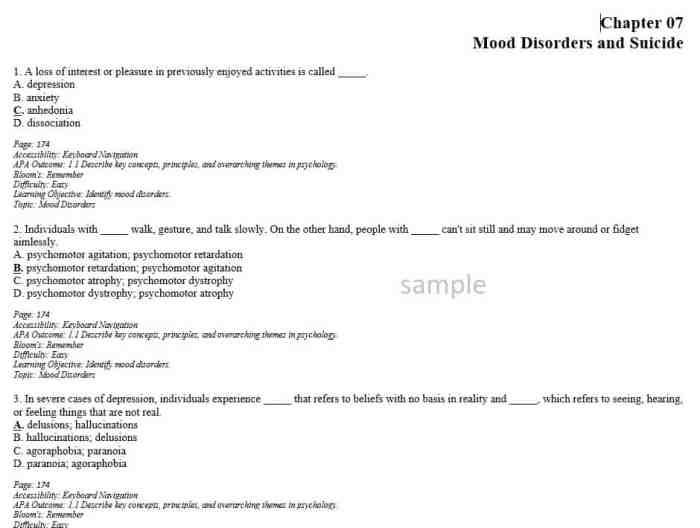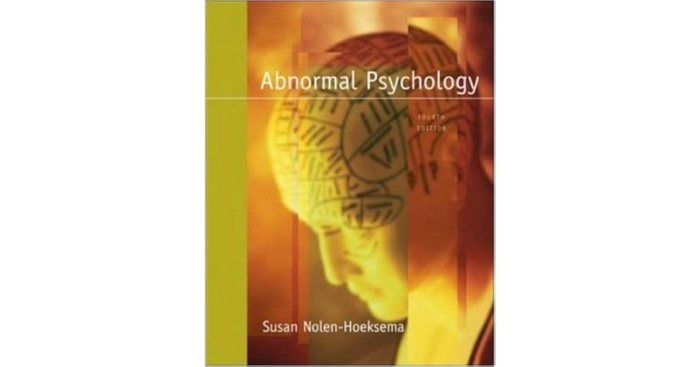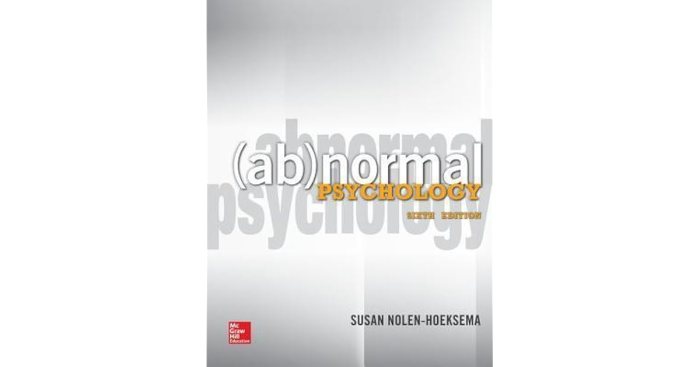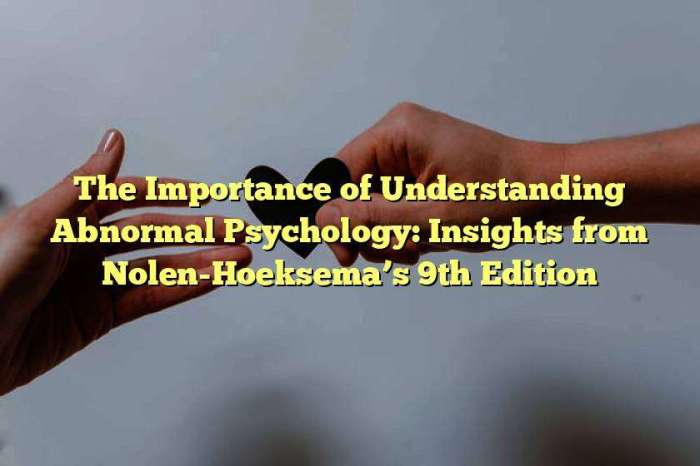Abnormal psychology nolen hoeksema 9th edition – Abnormal Psychology: Nolen-Hoeksema’s Comprehensive Guide, 9th Edition embarks on a journey through the intricate world of mental health, providing a comprehensive understanding of the theories, assessment, diagnosis, and treatment of psychological disorders. This authoritative text unveils the latest research and insights, guiding readers towards a deeper comprehension of the complexities of abnormal psychology.
From its historical roots to contemporary perspectives, this edition delves into the major theoretical frameworks that shape our understanding of mental disorders. It explores the intricate interplay between psychological, biological, and social factors in the development and manifestation of mental health conditions.
Definition and History of Abnormal Psychology: Abnormal Psychology Nolen Hoeksema 9th Edition

Abnormal psychology is the study of unusual, maladaptive, or distressing thoughts, feelings, and behaviors. According to Nolen-Hoeksema’s 9th edition, abnormal psychology aims to understand the causes, development, diagnosis, and treatment of mental disorders.
The history of abnormal psychology can be traced back to ancient times, with early beliefs often attributing mental illness to supernatural forces. In the 19th century, the field began to emerge as a scientific discipline, with pioneers like Emil Kraepelin and Sigmund Freud developing influential theories and methods.
Theories of Abnormal Psychology

Psychodynamic theory focuses on unconscious conflicts and early childhood experiences as the root of mental disorders. Behavioral theory emphasizes the role of learning and environmental factors in shaping behavior, while cognitive theory explores the influence of thoughts and beliefs on mental health.
Humanistic theory emphasizes the importance of self-actualization and personal growth in understanding and treating mental disorders.
Assessment and Diagnosis of Abnormal Behavior
Assessment involves gathering information about an individual’s symptoms, history, and functioning. Methods include clinical interviews, psychological tests, and observation. Diagnosis is made based on criteria Artikeld in the Diagnostic and Statistical Manual of Mental Disorders (DSM-5), which provides standardized definitions and criteria for mental disorders.
Treatment of Abnormal Behavior

Treatment approaches include psychotherapy, medication, and hospitalization. Psychotherapy aims to change maladaptive thoughts, feelings, and behaviors. Medication can help manage symptoms and improve functioning. Hospitalization may be necessary in cases of severe mental illness or danger to self or others.
Specific Mental Disorders
Anxiety disorders involve excessive fear or anxiety. Mood disorders include depression and bipolar disorder, which affect mood and behavior. Personality disorders are characterized by inflexible and maladaptive personality traits. Psychotic disorders, such as schizophrenia, involve disruptions in reality testing and thought processes.
Cultural and Social Factors in Abnormal Psychology

Cultural and social factors can influence the expression and experience of mental disorders. Stigma and discrimination can worsen the effects of mental illness. Social support and community resources can play a protective role.
Prevention and Early Intervention
Prevention strategies aim to reduce the risk of developing mental disorders. Early intervention focuses on identifying and treating mental health problems at an early stage, improving outcomes and reducing the impact of mental illness.
Question Bank
What is the primary focus of Abnormal Psychology: Nolen-Hoeksema’s Comprehensive Guide, 9th Edition?
This text provides a comprehensive overview of abnormal psychology, covering theories, assessment, diagnosis, and treatment of mental disorders.
What are some of the key theoretical perspectives explored in the book?
The book examines psychodynamic, behavioral, cognitive, and humanistic approaches to understanding and treating mental disorders.
How does the book address the assessment and diagnosis of abnormal behavior?
It discusses clinical interviews, psychological tests, and observation as methods for assessing and diagnosing mental disorders, using criteria from the Diagnostic and Statistical Manual of Mental Disorders (DSM-5).
What treatment approaches are covered in the book?
Psychotherapy, medication, and hospitalization are among the treatment approaches explored, with discussions of their effectiveness and limitations.
How does the book address cultural and social factors in abnormal psychology?
It examines the influence of culture and society on the development and expression of mental disorders, as well as the role of stigma and discrimination.